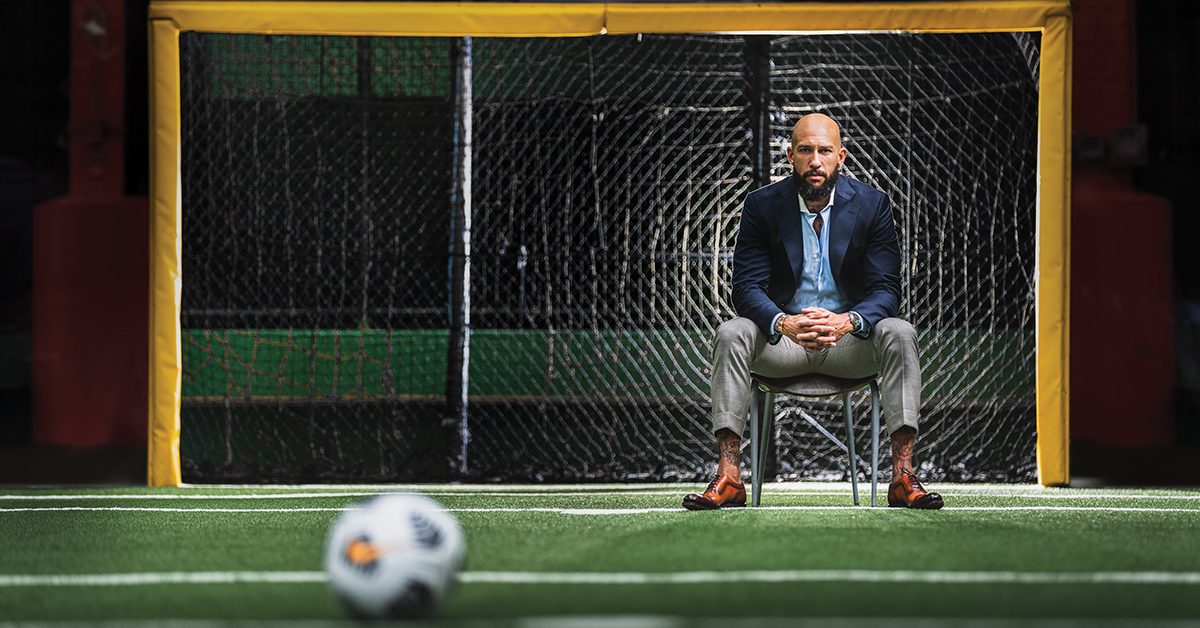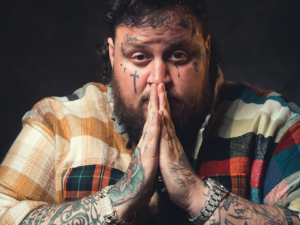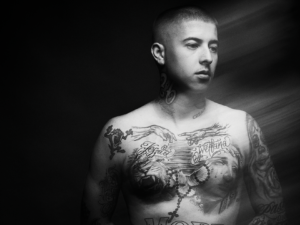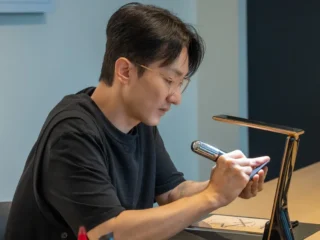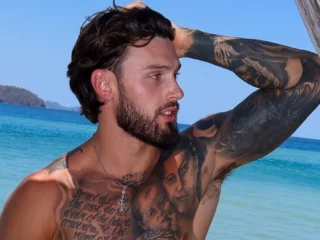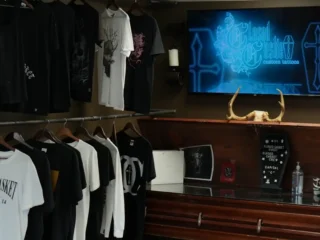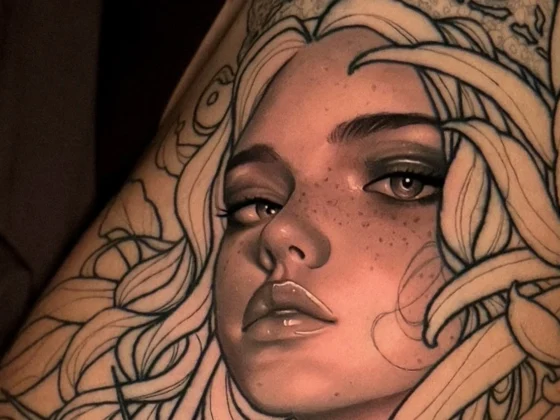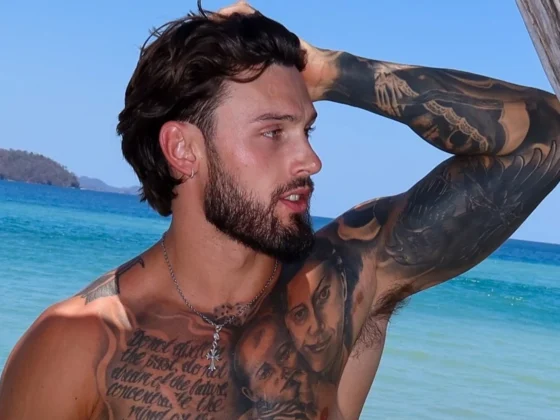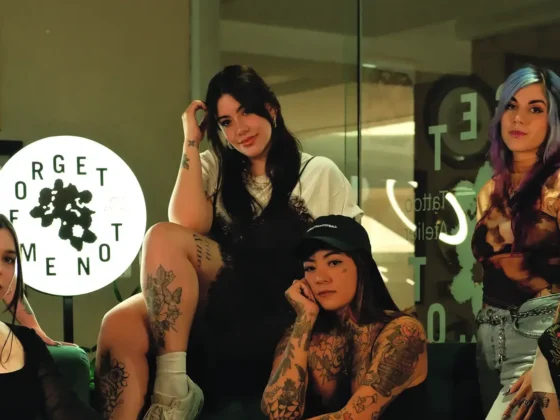Charlie Connell
February 3rd, 2021
Keeping It Real
Going straight from the pitch to the television studio, Tim Howard is smoothly making the transition from world class goalkeeper to astute analyst.
Fate can be a very funny thing.
Whether or not you even believe in fate or destiny, it’s undeniable that there are millions of little instances that must happen in an exact manner to get a person to where they end up. Even the slightest alteration in one’s path can determine entire decades of the future. It can be as banal as taking a left instead of a right, taking drama instead of band in high school or, in the case of Tim Howard, experiencing his first overdose of youthful exuberance in fall, not spring.
“I was a rambunctious 6-year-old and my mom said, ‘You gotta get out of the house. You’ve got to do something, pick a sport,’” Howard says. “It was fall, so the first one was soccer, so soccer was it. I went out there and the love affair began. It was everything—I got to run around and be with my friends, yell, scream, slide on the ground, get muddy, kick the ball. It was brilliant.”
At the time, his mother likely thought she was simply buying herself a couple of hours of relaxation while a young Howard ran off some steam. There’s no way she could have predicted it would alter the entire future of soccer in the United States.
Howard found so much more than an outlet for the well of activity bubbling inside of him; he found a passion that will consume him for the rest of his days. After spending two decades as a goalkeeper in Major League Soccer (MLS), the Premier League and for the United States Men’s National Team, Howard has traded in his kit for a suit.
Splitting his time between serving as sporting director for Memphis 901 FC of the USL Championship and appearing as an analyst for NBCSN’s coverage of the Premier League, Howard found a way to keep the beautiful game in his life even with his playing days behind him.
Howard wasn’t the first American to find success playing in England, but unlike many of his predecessors, his success was sustained over a period of more than a decade. An entire generation of Everton supporters knew only of a team with Howard between the sticks. But when he first made the jump from the MetroStars of the MLS to a tiny little club named Manchester United back in 2003, English fans were very skeptical of the American goalkeeper.

The papers took aim at Howard, not because of his playing style or his youth, but because of the affliction he has been dealing with since he was 10—Tourette syndrome. “I signed for Man United and in the press, one of the tabloid papers, and they’re all tabloids over there, it said, ‘Man United Signs Disabled Goalkeeper,’” Howard recalls. “If I’m being honest, I’ve always been a pretty bold and confident person, even as a young kid. Really, if I’m being brutally honest, I had just signed for Manchester United. I became a millionaire overnight, nothing was going to take the wind out of my sails.”
English football supporters are often noted for their chants, which vary from the mundane to the profane. And much like the tabloids, Howard’s disorder found its way into chants from supporters of his club and from rival clubs. “Manchester United fans had a song that I probably can’t repeat, but it was endearing,” Howard says. “Opposing fans would also chant about it. You’d hear thousands and thousands of people chanting about my Tourette syndrome. In a really odd way, it was somewhat loving. I never really took it seriously. Someone once told me that when they stop talking about you is when you need to worry, so good or bad, I’ll take it.”
People were certainly talking about Howard when he made his debut at one of the most hallowed grounds in the sport, Old Trafford. Being the goalkeeper for Manchester United can be an overwhelming burden, particularly for a kid from New Jersey whose entire professional career had been played in the United States.
“It was scary as hell,” Howard remembers about the first time he walked onto the Old Trafford pitch. “It was cool, as I was this kid who came from nowhere, but I was also realizing that wasn’t going to pay the bills. I needed to figure this thing out very quickly, I was getting thrown into the deep end. It was one of the scariest moments of my life.”
And figure it out he did. During his time at United, Howard played a key role in many memorable games, including stopping the decisive penalty against Arsenal to win the Community Shield. Despite this, his time in Manchester would be brief, as he was soon loaned out to Everton. It was in Liverpool where Howard would find his place.
“I spent three years at Man United and then 10 glorious years at Everton Football Club,” Howard says. “Outside of my two children, Everton Football Club is the greatest thing that ever happened to me. Being able to play 400 times for that club, becoming an Evertonian myself, loving the fans and having them love me, feeling like that’s home… there’s nothing like it in the world.
“Playing at the Gwladys Street End [at Everton’s home, Goodison Park] with all those Blues behind you, just willing you on, having this togetherness,” he continues, “yeah, I’m on the field playing, but they’re there. It’s just one family, one team, it’s really special. Like I’ve said, I played for Manchester United, which is the biggest football club in the world, and I’ve played for Everton, which is the greatest football club in the world.”
In Europe, it was Howard’s play at Everton that captivated football fans, but in the United States he cemented his reputation by playing for his country. For decades the sport would enjoy a brief time in the spotlight every four years during the World Cup. More often than not the door would close on the popularity when the US Men’s National Team was eliminated, usually during the group stage.

This changed a little in 1994 when the United States hosted the tournament, but even that boost was fleeting. In the 2000s things started to change thanks to a trio of stars who carried the USMNT to new heights. With forwards Landon Donovan and Clint Dempsey pouring in goals and Howard keeping the ball out of the net, the USMNT became a force to be reckoned with.
“Any soccer player who grows up with a ball at their feet dreams about playing for their country,” Howard says. “Then once you dream about playing for your country, you very quickly dream about playing in a World Cup. When you know that’s the highest representation you can have as a player it drives you. It drives you to eat, sleep and breathe the game, to do everything in your power to get selected to play in the World Cup. To hear the national anthem being played before going out to play against the best teams in the world, I dedicated my life to [achieving] that.”
Given the importance Howard placed on the honor of playing for the USMNT, it’s no surprise that some of his greatest performances came while wearing the national shirt. He bookended his World Cup career with two performances for the ages. His debut came against England at the 2010 World Cup, where he earned Man of the Match honors in a 1-1 draw against a heavily favored opponent. But it was his performance against Belgium in 2014 that he will be remembered for.
The United States was facing a Belgium team that was stacked with talent on both ends of the pitch. Howard faced an absolute barrage of shots without letting one past for 90 minutes. Belgium broke through in extra time, eventually winning the match 2-1. Even in defeat, Howard walked away with Man of the Match honors as he made 15 saves, a World Cup record.
An opportunity to move on to face Argentina and Messi slipped through the team’s fingers, but that is mostly forgotten by USMNT fans who remember the joy of watching one of the world’s best keepers give the performance of his career. “Ultimately, when all is said and done, people remember my career for a lot of things, but mostly for that,” Howard shares. “It’s really nice now that I’m an old washed-up soccer player and people have vivid memories about where they were and they want to talk about it. It’s a really special thing to have a signature moment people care to remember fondly.”
Being a soccer star in this country carries a bit more responsibility than it does in other places where the sport is more popular. Stars like Howard are expected to do more than just compete on the pitch; they are also expected to have a hand in growing the game in the sporting culture at large.
“I realized that after we went to the World Cup in South Africa and we went to the World Cup in Brazil, there was a crossover taking place during our generation,” Howard says. “People on Wall Street leaving their jobs early to go into the park, drink a beer and watch on the big screen. NBA and NFL players wearing soccer jerseys and tweeting about the World Cup—now you know you’re part of a generation that helped the sport cross over into a whole other realm.”
After doing so much for the game from the pitch, Howard is now doing his part from the analyst’s chair. NBCSN’s extensive coverage of the Premier League has been pivotal in creating a new generation of soccer fans. Twenty years ago it was rare to find an American capable of naming more than two or three English teams; now it’s not out of the ordinary to see somebody sitting on the bus wearing a Wolverhampton scarf.
After spending 22 years on the other side being criticized by commentators, the boot is now on the other foot. This doesn’t mean that Howard is taking personal grievances into the studio with him—it means he’s offering up a viewpoint that can only be held by a goalkeeper who has spent a lifetime watching the game take shape from the back. “You’re oftentimes not right in the thick of it, so you see this broad perspective of the field in terms of tactical awareness and spacing,” Howard explains. “You end up seeing the game differently than other people. Not a better perspective, but a different perspective. I try my best to offer insight in regards to what a defender is thinking in a moment because of what attackers are trying to do to defenders, how an attacking team will try to overload one side to make defenders uncomfortable.”
You might not be able to tell while watching Howard on TV, but underneath his business suit he’s sporting a massive collection of tattoos. It’s obvious that he is a fan of black-and-grey with great taste, particularly in the portraiture he has collected.
Howard started collecting tattoos in the ’90s, so just like practically everybody else who was tattooed in the ’90s he has some tribal. But it’s his first tattoo, a Superman symbol, that truly stands out as a time capsule. “I was 16 years old and I went down to this place in Jersey with my brother’s fake ID,” Howard laughs. “It was 1996 and I think Superman was a thing. I think Shaquille O’Neal had a Superman, so I was like, ‘I’m gonna get a Superman.’ It wasn’t the smartest idea, but I was cool the next day in school. At least I thought I was cool, everybody else probably thought I was an idiot (laughs).”
His own coolness may have been up for debate, but there is no denying the cool factor of a certain portrait Howard had tattooed by Emma Kierzek. “I’ve got some really cool portraits that are just special, they capture a moment,” he says. “JFK was the personification of coolness and here he is just smoking a heater, in a tuxedo, chilling somewhere.”
While he adores his many portrait tattoos—in addition to the 35th president he also has portraits of his children, his grandfather and others—the tattoo with the best story behind it is the piece of script on his hand. “I’m a product of the golden era of hip-hop and Nas is the greatest MC of all time,” Howard says. “I’m not a ‘wanna meet you’ type of person, but I had to meet Nas. I pulled out all the stops, talked to a bunch of friends, and I ended up going backstage and meeting him.
“I was like, ‘Yo, this might be a little weird, but if you sign my hand I would love to get it tattooed,’” he continues. “So he signs my hand. It’s midnight, I’m calling all over Denver trying to find one of my tattoo artists but no one is open. So I had to sleep with my hand off the bed to make sure it wouldn’t smudge. So that’s my favorite. For sure. Easily.”
A lot of athletes have a hard time when their career is over. For some, it’s tough to know when exactly is the right time to hang it up. Others have trouble transitioning into the new phase of their lives. Not Howard.
“Quite honestly, I have no desire to play the game of soccer,” he says. “My body is beat up after 22 long years. I’m very thankful for what the game has given me, it’s given me everything. But the time was right.”
What if a 6-year-old Tim Howard had never stepped foot on that muddy field so many years ago? Would people still be ducking out of their offices to watch the USMNT play in the World Cup? Would thousands of blue-clad Americans head out to the bar at 7 a.m. to watch Everton Football Club take on their hated rivals, Liverpool?
We’ll never know the answers to these questions simply because fate placed Tim Howard exactly where he was supposed to be.

Special thanks to the gracious team at Chelsea Piers for hosting this photoshoot.
Editor's Picks
Royal & The Serpent
The hilarious and talented musician talks mental health, music, tattoos and more
Son of a Sinner
From rough-and-tumble roots to mainstream stardom, this genre-crossing musician is on a roll
A Cut Above
Celebrated barber Vic Blends can charge whatever he wants for a haircut, but all he really wants in exchange is a conversation and human connection

